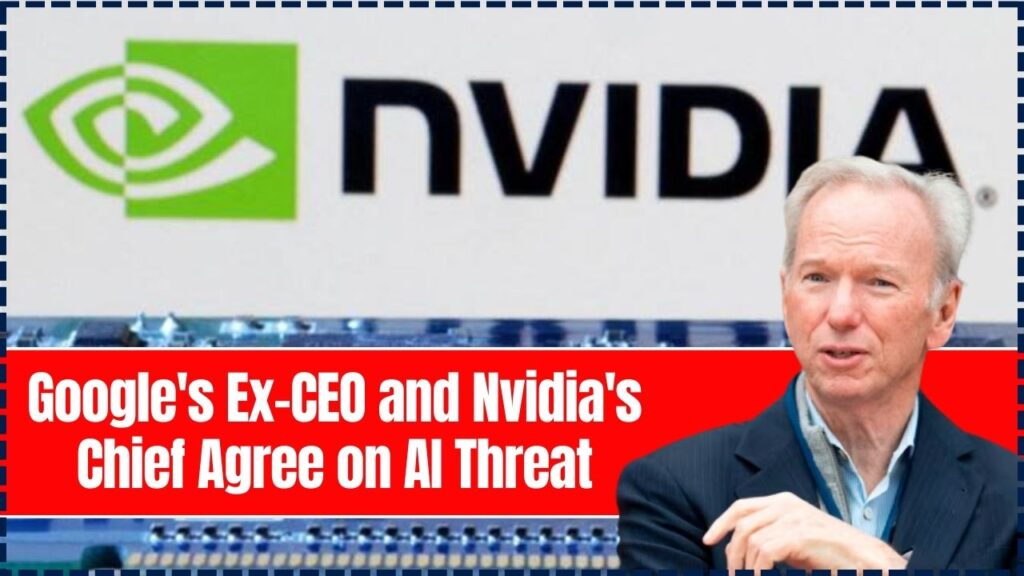Google’s Ex-CEO and Nvidia’s Chief Agree on AI Threat: In a powerful and rare alignment, two of the most respected voices in the tech industry—Eric Schmidt, former CEO of Google, and Jensen Huang, CEO of Nvidia—have voiced serious concerns about the growing power and risks of artificial intelligence (AI). Both leaders warn that failing to adapt to AI could mean not just job loss but irrelevance in the global economy.

In separate interviews and speeches, Schmidt and Huang highlighted the transformative potential of AI while emphasizing the urgent need for individuals, companies, and even governments to take the technology seriously. If you’re a student, a working professional, a policymaker, or simply curious about the future, their combined insights offer a wake-up call—and a roadmap.
Google’s Ex-CEO and Nvidia’s Chief Agree on AI Threat
| Topic | Details |
|---|---|
| Who Spoke | Eric Schmidt (ex-Google CEO), Jensen Huang (Nvidia CEO) |
| Main Concern | AI could replace those who don’t adopt and learn how to work with it |
| Geopolitical Risks | Countries falling behind in AI could face national security risks |
| Call to Action | Everyone must develop AI literacy, including how to prompt and work with generative AI tools |
| More Info | Eric Schmidt at TED, Nvidia AI Insights |
The warnings from Eric Schmidt and Jensen Huang are not meant to scare—they’re meant to prepare. AI is reshaping industries, economies, and societies. Those who embrace AI thoughtfully and strategically will be better positioned for success in the years ahead.
So whether you’re 15 or 55, working in healthcare, finance, education, or the arts—now is the time to learn, adapt, and lead. AI is here. The question is: Are you ready?
Why Are AI Warnings Making Headlines in 2025?
AI has moved beyond buzzwords. With tools like ChatGPT, Midjourney, Gemini, and Claude now helping people write emails, generate music, code software, and even draft legal documents, it’s clear that AI is not just another tech trend—it’s a global shift.
According to Statista, the global AI market is projected to reach $407 billion by 2027, up from just $95 billion in 2021. This exponential growth means two things:
- Opportunity: AI can increase productivity and creativity.
- Risk: Those who don’t learn to use AI risk being left behind.
Eric Schmidt summed it up best: “If you don’t work with AI, someone who does will replace you.”
What Eric Schmidt Said – The Existential Risk of Ignoring AI
Eric Schmidt has long been an advocate for tech innovation, but his recent messages about AI are more urgent and cautionary. Speaking at TED 2025, he warned that individuals, industries, and even nations risk becoming obsolete if they don’t strategically embrace AI.
“AI will touch every job, every company, every government. This is not optional anymore.”
Key Points From Schmidt:
- Jobs are changing: Every industry will require AI integration.
- National security: Nations falling behind in AI could face military and economic consequences.
- Global tensions: An AI arms race between superpowers like the U.S. and China could increase instability.
What Jensen Huang Said – The Future Belongs to AI Prompt Engineers
Jensen Huang, whose company Nvidia powers most of today’s AI hardware, also struck a serious tone. He emphasized that future workers must learn to guide AI tools effectively—a skill known as prompt engineering.
“Prompting is an art form. You must know how to tell AI what to do, and that takes skill.”
Key Takeaways from Huang:
- AI literacy is now as essential as reading and writing.
- Prompt engineers will be in high demand across all industries.
- Those who ignore AI risk losing their jobs to those who embrace it.
What Does This Mean for You? (Real-Life Examples)
Whether you’re a student, a small business owner, or a tech professional, here’s how Schmidt and Huang’s warning could apply to your life:
Example 1 – Marketing Manager
- Before AI: Writes newsletters manually.
- With AI: Uses ChatGPT to draft and optimize emails, saving 10 hours/week.
- Risk if ignored: A competitor who uses AI produces more content in less time and gains market share.
Example 2 – Student
- Before AI: Relies on books and teachers.
- With AI: Uses Claude or Gemini to explain hard topics instantly.
- Risk if ignored: Classmates using AI tools get better grades and job offers.
Example 3 – Small Business Owner
- Before AI: Hires graphic designer.
- With AI: Uses Midjourney to generate marketing posters.
- Risk if ignored: Higher costs and slower turnaround times.
Respond: A Practical Guide to AI Readiness
The good news? It’s not too late to get started. Here’s how you can become AI-resilient and future-ready:
1. Learn the Basics
- Understand what AI is and how it works.
- Free resources: Google AI Education, Elements of AI
2. Master Prompting Skills
- Practice giving clear instructions to ChatGPT or similar tools.
- Think like a coach: precise, goal-focused input yields better output.
3. Integrate AI Into Your Daily Work
- Automate repetitive tasks.
- Use AI for brainstorming, content generation, or coding.
4. Stay Updated
- Follow AI thought leaders on LinkedIn or YouTube.
- Subscribe to newsletters like The Algorithm by MIT Tech Review.
5. Advocate for Responsible AI Use
- Push for ethical guidelines at work.
- Be cautious with AI-generated misinformation.
FAQs On Google’s Ex-CEO and Nvidia’s Chief Agree on AI Threat
Q1. Is AI going to take my job?
A: Not necessarily. AI will likely change your job, not take it—unless you ignore it. Embrace AI to stay competitive.
Q2. What is prompt engineering?
A: It’s the skill of crafting effective inputs or queries that guide AI tools to produce accurate, useful results.
Q3. How do I start learning AI?
A: Use free courses like Coursera’s AI for Everyone or Google’s AI resources.
Q4. Are AI tools expensive?
A: Many powerful AI tools like ChatGPT, Gemini, and Midjourney have free or low-cost plans.
Q5. Should kids learn about AI?
A: Yes! AI will be part of their future. Teaching kids to use AI ethically is like teaching them to use the internet responsibly.






